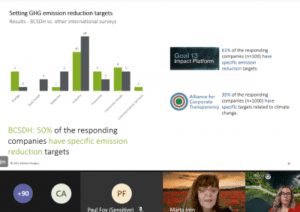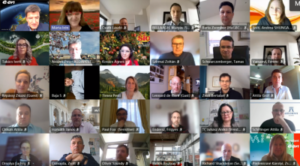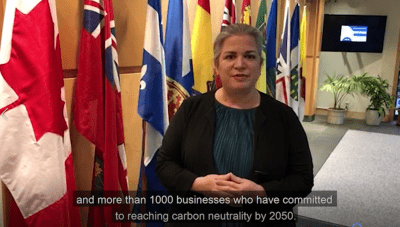Budapest, January 26, 2022: 31% of Hungary’s leading companies have already made a commitment to net zero. Significant financial resources are needed to accompany the expected increase in commitments. Is green funding ready to fill the gap? The Business Council for Sustainable Development in Hungary (BCSDH) and the British Embassy held a business forum with the participation of the Net Zero Advisory Board to present the current domestic and European situation of green financing to business actors.
It is important for as many companies as possible to commit to net zero targets, potentially even by joining the UN Race to Zero Campaign, but it is also essential to find the means by which to help them in this process.
“This event helps orientate companies to where they can source funding to decarbonise their operations. I hope it will encourage Hungarian businesses to sign up to the UN’s global Race to Zero Campaign where progressive businesses commit to the Net Zero target by 2050. Not only is this a target driven by government and international commitments and good for the planet, but it makes good business sense too” – said Richard Shackleton, Deputy Head of Mission of the British Embassy in his opening remarks.
The COP26 climate conference in Glasgow was a success in this field and the global financial sector appeared to be ready for action. With the announcement by the Glasgow Financial Alliance for Net Zero (GFANZ) it has become clear that 100+ trillion dollars are potentially available for engaging in climate action. Further, there was the historical launch of the International Sustainability Standards Board (ISSB) – a long-desired global standard-setter for capital market sustainability (ESG) disclosure that will truly prepare the world for the consolidation and standardization of materiality-based reporting on greenhouse gas emissions.
The EU also wants to mobilize its green financial resources.
“Hungary wants to be a net climate-neutral country by 2050, and we have also committed to a 55 percent national reduction by 2030. Companies play a key role in this process, and the domestic financial and consulting sector is also prepared to accelerate the process, for which such forums are essential” – highlighted Attila Chikán Jr., President of the BCSDH, pointing out the long-term positive processes that are just beginning.
“Inevitably, capital market engagement for business will radically change in this decade, and the standardization of ESG disclosure will integrate impacts on natural and social capital into the cost of capital for companies” – he added.

Csaba Kandrács Dr., Deputy Governor of Hungarian National Bank spoke about “The Hungarian National Bank’s policy in support of sustainable financing in 2022”
Szabolcs Ágostházy Dr., Prime Minister’s Office’s State Secretary for EU Development Projects, gave a presentation about “EU funds for green investments in the 2021-2027 period”
Ákos Lukács, Head of Sustainability and Climate Change of Deloitte spoke about “Corporate net-zero ambitions matching sustainable finance products”
Gergely Pókos, Director of Green Program Directorate of OTP Bank gave a presentation about “Vision of green banking products in corporate finance practice”
The BCSDH aims to generate changes in models and business solutions in Hungary that have a real impact on climate change and can generate real responses to domestic challenges due to their take up by other companies. An important step has been the establishment of the Net Zero Advisory Board that has the aim of increasing the focus on economic, governmental, and social factors in the transition to a carbon-neutral economy.

***
Race to Zero
The Race to Zero is the UN-led campaign for a zero-carbon world. Close to 5227 businesses, including the likes of Facebook, Tesco, LafargeHolcim, and Magyar Telekom, and 441 of the biggest investors have joined the global Race to Zero campaign, along with over 1049 cities, 23 regions, and 1039 universities. Businesses of all sizes and across all sectors have a clear role to play in climate action, in line with the Paris Agreement.
Over the coming years, every sector in every market will be transformed as the transition to a low-carbon economy is underway. Committing to the Race to Zero goals of net zero carbon emissions by 2050 is also taking the steps necessary to protect and grow your business by reducing costs, by enhancing access to investor capital, by staying ahead of policies and regulations to limit GHG emissions, by increasing your business’ preparedness to external shocks, and by leading on tomorrow’s innovation and transformation.






 Transitioning to a circular economy is a great business opportunity today. The core of the concept is not yet deeply understood by most companies, although the use of this model can increase the resilience of the world economy and facilitate the achievement of the Paris Climate Change Agreement and the United Nations Sustainable Development Goals. The circular economy could generate business opportunities worth $4.5 billion worldwide by 2030.
Transitioning to a circular economy is a great business opportunity today. The core of the concept is not yet deeply understood by most companies, although the use of this model can increase the resilience of the world economy and facilitate the achievement of the Paris Climate Change Agreement and the United Nations Sustainable Development Goals. The circular economy could generate business opportunities worth $4.5 billion worldwide by 2030.




















 Peter Bakker
Peter Bakker





 “Five years ago, by adopting the Paris Agreement, our countries committed to decreasing their greenhouse gas emissions but it was only the beginning. The urgency remains and it’s up to us, governments, private companies and citizens to turn these commitments into reality. This is our shared responsibility!” – French Ambassador Pascale Andréani said in her closing remarks.
“Five years ago, by adopting the Paris Agreement, our countries committed to decreasing their greenhouse gas emissions but it was only the beginning. The urgency remains and it’s up to us, governments, private companies and citizens to turn these commitments into reality. This is our shared responsibility!” – French Ambassador Pascale Andréani said in her closing remarks. “Fighting climate change, climate protection is teamwork. Our common goal is to achieve climate neutrality by 2050, where all contributions count. Renewables are taking over in the power sector in Europe. Next steps in energy transition: replace fossil fuels in transport, industry and heating. Hydrogen will play a crucial role” – German Ambassador Johannes Haindl said. Germany holds the rotating presidency of the European Union from 1 July 2020 which sets the standard for achieving climate neutrality.
“Fighting climate change, climate protection is teamwork. Our common goal is to achieve climate neutrality by 2050, where all contributions count. Renewables are taking over in the power sector in Europe. Next steps in energy transition: replace fossil fuels in transport, industry and heating. Hydrogen will play a crucial role” – German Ambassador Johannes Haindl said. Germany holds the rotating presidency of the European Union from 1 July 2020 which sets the standard for achieving climate neutrality. “We are proud to be collaborating with the British Embassy and our other partners on the Race to Zero Business Ambitions Forum and working for a carbon neutral world by 2050. Climate change is a global problem and it will take a coordinated response to find global solutions. Canada continues its work to reduce emissions and build resilient communities and a low carbon economy, knowing the strong connection such efforts have with long-term health and financial well-being.” – Canadian Ambassador Caroline Charette said in her closing remarks.
“We are proud to be collaborating with the British Embassy and our other partners on the Race to Zero Business Ambitions Forum and working for a carbon neutral world by 2050. Climate change is a global problem and it will take a coordinated response to find global solutions. Canada continues its work to reduce emissions and build resilient communities and a low carbon economy, knowing the strong connection such efforts have with long-term health and financial well-being.” – Canadian Ambassador Caroline Charette said in her closing remarks. “The Netherlands deems climate actions very timely and important that is why it will host the Climate Adaptation Summit on 25 January 2021, focusing on how we can adapt globally to the changing climate and what solutions need to be scaled up further. Please, join this on-line event which will mobilise governments, companies, organisations and citizens worldwide in order to set out a roadmap towards a climate-resilient future by 2030!” – Dutch Ambassador René van Hell said.
“The Netherlands deems climate actions very timely and important that is why it will host the Climate Adaptation Summit on 25 January 2021, focusing on how we can adapt globally to the changing climate and what solutions need to be scaled up further. Please, join this on-line event which will mobilise governments, companies, organisations and citizens worldwide in order to set out a roadmap towards a climate-resilient future by 2030!” – Dutch Ambassador René van Hell said.

